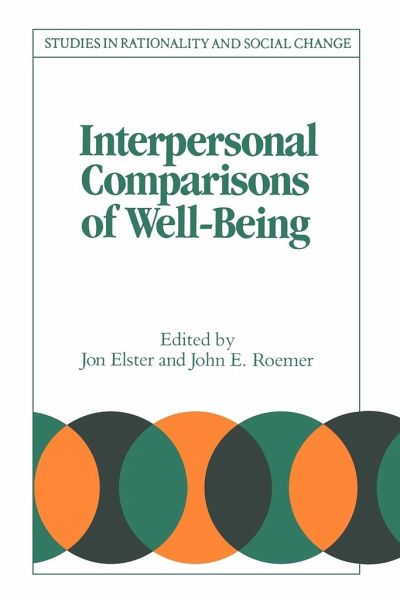
Interpersonal Comparisons of Well-Being
Versandkostenfrei!
Versandfertig in 1-2 Wochen
79,99 €
inkl. MwSt.

PAYBACK Punkte
40 °P sammeln!
In this volume a diverse group of economists, philosophers, political scientists, and psychologists address the problems, principles, and practices involved in comparing the well-being of different individuals. A series of questions lie at the heart of this investigation: What is the relevant concept of well-being for the purposes of comparison? How could the comparisons be carried out for policy purposes? How are such comparisons made now? How do the difficulties involved in these comparisons affect the status of utilitarian theories? This collection constitutes the most advanced and comprehe...
In this volume a diverse group of economists, philosophers, political scientists, and psychologists address the problems, principles, and practices involved in comparing the well-being of different individuals. A series of questions lie at the heart of this investigation: What is the relevant concept of well-being for the purposes of comparison? How could the comparisons be carried out for policy purposes? How are such comparisons made now? How do the difficulties involved in these comparisons affect the status of utilitarian theories? This collection constitutes the most advanced and comprehensive treatment of one of the cardinal issues in social theory.
Table of contents:
Acknowledgments; Introduction Jon Elster and John E. Roemer; 1. The moral basis of interpersonal comparisons Thomas M. Scanlon; 2. Against the taste model James Griffin; 3. Utilitarian metaphysics? John Broome; 4. Local justice and interpersonal comparisons Jon Elster; 5. Notes on the psychology of utility Daniel Kahneman and Carol Varey; 6. Adult-equivalence scales, interpersonal comparisons of well-being, and applied welfare economics Charles Blackorby and David Donaldson; 7. Interpersonal comparisons of utility: why and how they are and should be made Peter J. Hammond; 8. A consideration of the Harsanyi-Sen debate on utilitarianism John A. Weymark; 9. Deducing interpersonal comparisons from local expertise Ignacio Ortuno-Ortin and John E. Roemer; 10. Subjective interpersonal comparison Aanund Hylland; 11. Utilitarian fundamentalism and limited information C. D'Aspremont and L. A. Gerard-Varet; Index.
In this volume a diverse group of economists, philosophers, political scientists, and psychologists address the problems, principles, and practices involved in comparing the well-being of different individuals.In this volume a diverse group of economists, philosophers, political scientists, and psychologists address the problems, principles, and practices involved in comparing the well-being of different individuals.
Table of contents:
Acknowledgments; Introduction Jon Elster and John E. Roemer; 1. The moral basis of interpersonal comparisons Thomas M. Scanlon; 2. Against the taste model James Griffin; 3. Utilitarian metaphysics? John Broome; 4. Local justice and interpersonal comparisons Jon Elster; 5. Notes on the psychology of utility Daniel Kahneman and Carol Varey; 6. Adult-equivalence scales, interpersonal comparisons of well-being, and applied welfare economics Charles Blackorby and David Donaldson; 7. Interpersonal comparisons of utility: why and how they are and should be made Peter J. Hammond; 8. A consideration of the Harsanyi-Sen debate on utilitarianism John A. Weymark; 9. Deducing interpersonal comparisons from local expertise Ignacio Ortuno-Ortin and John E. Roemer; 10. Subjective interpersonal comparison Aanund Hylland; 11. Utilitarian fundamentalism and limited information C. D'Aspremont and L. A. Gerard-Varet; Index.
In this volume a diverse group of economists, philosophers, political scientists, and psychologists address the problems, principles, and practices involved in comparing the well-being of different individuals.In this volume a diverse group of economists, philosophers, political scientists, and psychologists address the problems, principles, and practices involved in comparing the well-being of different individuals.














